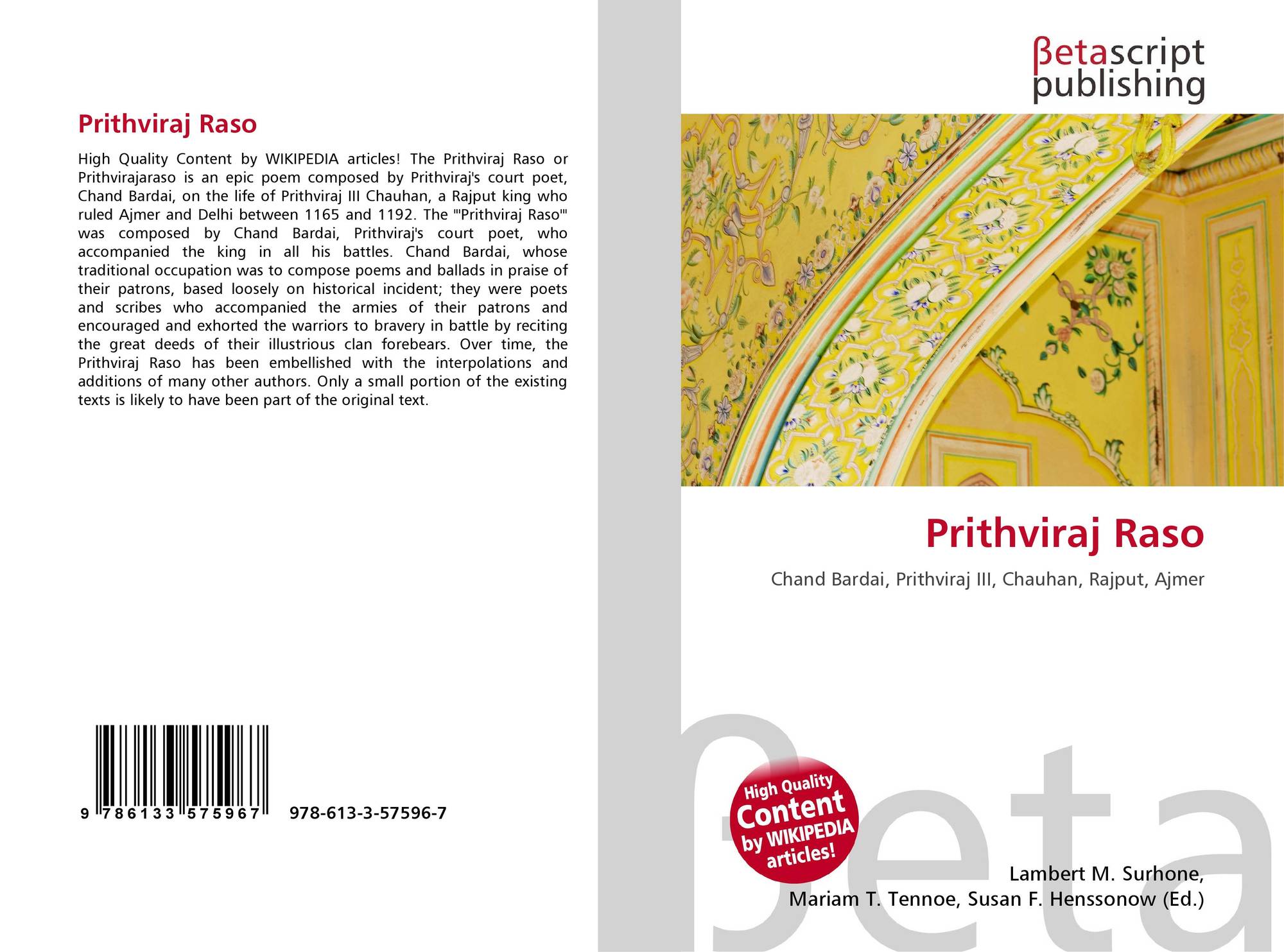Prithviraj Raso In English Pdf
The cover of a Prithviraj Raso version published by the Language Genre(s) The Prithviraj Raso (: Pṛthvīrāj Rāso) is a epic poem about the life of the 12th century Indian king (c. 1166-1192 CE).
EMBED (for wordpress.com hosted blogs and archive.org item tags).

Prithviraj Raso In Hindi
It is attributed to, who according to the text, was a court poet of the king. The earliest extant copy of the text dates back to the 16th century, although some scholars date its oldest version to the 13th century. By the 19th century, several interpolations and additions had been made to the original text under the patronage from rulers.
The text now exists in four recensions. It contains a mixture of historical facts and imaginary legends, and is not considered historically reliable. Contents • • • • • • • • • History [ ] Authorship [ ] According to tradition, the Prithviraj Raso was composed by, Prithviraj's court poet ( raj kavi ), who accompanied the king in all his battles. The last canto, which narrates the death of Chand Bardai and Prithviraj, is said to have been composed by Chand Bardai's son Jalhan.
Most installers agree that learning to cut patterns is both difficult and time-consuming. Our system can also reduce film waste that can impact your profit margin. Llumar precision cut software download. With our system, you can become proficient in no time at all —helping to reduce labor and training costs while increasing productivity. When film is cut on the plotter vs.
Recensions [ ] The oldest extant recension of Prithviraj Raso is from 16th century. It exists in form a manuscript copied in 1610, for a grandson of Kalyanmal, the ruler of. Its oldest portions are written in (also called Latiya Apabhramsha) language and style typical of 12th and 13th centuries. According to R. Somani, the original Prithviraj Raso was composed around 1235 CE, within 3-4 decades after Prithviraj's death. Other scholars, such as Cynthia Talbot, Narottamdas Swami and Namwar Singh date the text to the 16th century, during the reign of.
Since 16th century, the size of the text has expanded greatly because of several interpolations and additions, resulting in multiple recensions. Only a small portion of the existing recensions is likely to have been part of the original version. A small 1300-stanza manuscript in is closest to the original text. The longest available version is the Udaipur (Mewar) manuscript, which is an epic with 16,306 stanzas. Today, four different recensions of the text are known: • Edited by Rajmal Bora: the shortest recension, titled Candvardāīkṛt Prithīrājrāsau • Edited by Mataprasad Gupta, titled Pṛthvīrāj Rāsau • Edited by Kavirav Mohansimha, titled Pṛthvīrāj Rāso • Edited by Mohanlal Vishnu Pandya and Shyamsundar Das, titled Pṛthvīrāj Rāso: the longest recesion, developed in late 17th century under the patronage of the Mewar court American academic Cynthia Talbot compiled a list of nearly 170 manuscripts of the text.
The patrons of only 17 of these can be identified: they include kings and princes from the royal families of, (Jaipur),,, and; and a chief of. The Mewar recension [ ] The present version of Prithviraj Raso is composed in dialect, with some regional peculiarities. Filesmonster premium account password. The language of the texts available today largely appears to be post-15th century and to be based upon the 17th-century compilation commissioned by, the ruler of. Amar Singh's predecessors had commissioned re-working of Prithviraj Raso, probably beginning in 1630s or 1640s, during the reign of. The version commissioned by Amar Singh was compiled by the poet Karuna-udadhi.
Its manuscript, generally dated to 1703 CE, states that 'stupid poets' had separated Chand Bardai's text into different parts: Karuna-udadhi wrote the current version by 'picking through the strands' on the orders of Amar Singh. The resulting text is actually a revised text, which is very different from the earlier versions of the text. This version appears to have been written as the part of a campaign to revive the Mewar dynasty's prestige, which had declined as a result of their setbacks against and later alliance with the. The Mewar recension enlarges and embellishes the role of the Mewar family in history, through their association with Prithviraj Chauhan. For example, it mentions Amar Singh's ancestor Samar Singh (Samarasimha) as the closest associate of Prithviraj Chauhan. On the other hand, the shortest recension of Prithviraj Raso does not even mention Samar Singh. The Mewar recension claims that Samar Singh married Prithviraj's sister Pritha, and fought alongside Prithviraj against Jaichand of Kannauj.
Rules for dammit card game. Score keeper keeps track of who made it and who 'popped'. You must make your bid. Dealer is forced to bid 0, 1, 3-up.